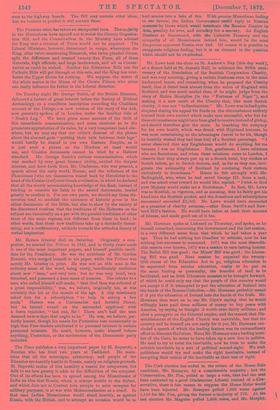Mr. Horsman spoke at Liskeard on Thursday, and spoke, as
he himself remarked, concerning the Government and the last session, in a very different sense from that which he had taken a year ago. Then he had nothing but blunders to criticise, now he has nothing but successes to commend. 1871 was the most discredit- able session ever known, 1872 was a session to earn lasting honour. The Ballot Bill was good ; the Mines' Bill was good; the Licens- ing Bill was good. Next session he expected the twenty- fifth clause of the Education Act to go, religious education to be separated from secular education, realty to be put on the same footing as personalty, the transfer of land to be facilitated, and an Irish Education measure tabe brought forward, of which he could only say that the people of this country would not accept it if it attempted to put the education of Ireland into the hands of the Roman Catholics,—Mr. Horsman probably meant if it put the education of Ireland into the hands of the Irish. Mr. Horsman then went on to cap Mr. Glyn's saying that he would willingly have paid three millions of money to buy peace with America, by saying he thought it worth even thirty millions ; and after a panegyric on the Colonial empire, and the remark that Dis- establishment of the English Church was inevitable, but that the country and he himself are not ready for it yet, Mr. Horsman con- cluded a speech of which the leading feature was its extraordinary effort to discount the future. Since Mr. Horsman was a leading mem- ber of the Cave, he seems to have taken up a new line in polities. He used to try to resist the inevitable, now he tries to make the evitable inevitable by a sort of political second-eight. We wish politicians would try and make the right inevitable, instead of accepting their notion of the inevitable as their test of right.


































 Previous page
Previous page